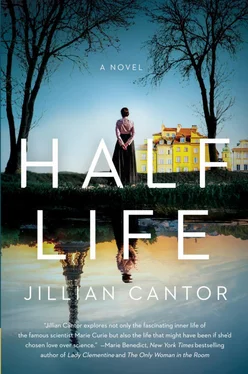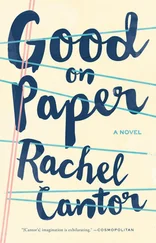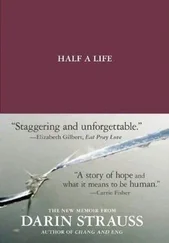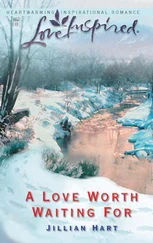“Yes,” Monsieur Kowalski finally clarifies as he takes a sip of his own tea and smiles at his bride. Madame Kowalska blushes at the obvious attention. “Pierre, Marie is conducting an experiment and needs more lab space. Marie, Pierre has the extra space. I thought if I introduced you both, you could work on an arrangement.” Are they truly trying to help me? Many of the men I have encountered since I’ve moved to Paris want nothing more than to bring me down. No man likes giving up anything to a woman.
“Tell me about your study,” Pierre says. He stares at me, his eyes so attached to my face it is unnerving. Is this some kind of a test? Maybe he is like the men in my physics classes. And if that’s true, I would not want to share a lab with such an insufferable creature.
“I have the funding, if that’s what you’re worried about,” I say, rather brusquely now. He continues to stare at me; it really is disconcerting.
“No, no.” He laughs a little. “I don’t care about the money. I am fascinated by your work. What kinds of steels will you be using, and how do you plan to account for the different variables? And I wonder if you might allow me to observe your methodology, so I might learn from you. Your reputation and your brilliance in the lab precede you, Mademoiselle Sklodowska.” He speaks quickly, breathlessly, his eyes holding on to mine. Perhaps he isn’t feigning interest, or testing me at all. Does he already view me as his equal? Does he truly want to learn, from me?
“Marie,” I correct him, softening my tone.
“Marie,” he repeats, my name turning into a smile on his lips. “Please, go on, tell me about your study.”
I feel myself relaxing, and I explain about the different kinds of steel I plan to test, the ways I will measure the magnetic properties using both vector and scalar magnetometers. He nods quickly; his eyes turn from pale blue to a blue green in the weakening light. When I’m done talking, he jumps in, talking about his piezoelectricity work with his brother, Jacques. Our words fly across the table, fast and electric, leaving me breathless. We’re two currents, zipping through water, side by side, charging each other to go faster and faster, hotter and brighter.
When I look up again, the room is quite dim. Outside the window the night is black, and only a sliver of moonlight shines through. The Kowalskis had left the table and neither Pierre nor I had noticed nor even thanked our hosts.
“Do you plan to always stay in Paris?” Pierre asks suddenly, out of nowhere.
“Oh goodness no,” I answer quickly. “As soon as my study is done and I complete my examinations I’ll move back to Poland to be with my family and to teach.” Though even as I say the words, words I’ve repeated many times with the greatest of sincerity since I’ve moved to Paris, suddenly they feel like a lie.
Loksow, Poland, 1894
Iwas a terrible piano student, but Leokadia was the most patient teacher. Or maybe she didn’t care that my fingers could never find the right notes and that my ears could not hear nor understand the melodies. She nodded and offered an encouraging smile, even when I played her back a D scale much too slow and filled with wrong notes. Of all the women in our university, I was the worst one at music lessons. But Leokadia looked at the chemistry equations I tried to teach much the same way I looked at a page of sheet music she handed out in class. And I offered her words of encouragement too. It isn’t so hard once you memorize all the elements, you see.
And she said, Ah, just like scales.
Still, I remained hopeless at playing a scale, and she could not remember the elements, as hard as she might try.
And yet we kept on, week after week, all of us women trying to teach one another what we each knew and loved. By the beginning of the new year, there were ten of us, and we began to break off and meet in smaller groups, because it was hard to find a place where ten women could go, week after week, undetected. Sometimes, Leokadia and I just met alone a second night of the week, too, and though we always tried to teach each other new things, alternating music and science, we also just enjoyed each other’s company.
There was an easiness to our friendship, a comfort that I found hard to come by with the other women, even the ones who loved the sciences, like me. I couldn’t exactly put my finger on why. Our interests and our knowledge and our lives couldn’t be further apart. I spent my day working hard as a governess for the Kaminski twins, and nights with my husband, trying to stay warm and fed, just above water. And she spent her days practicing piano in her parents’ well-heated apartment, her nights dressed in glamorous and expensive gowns, giving concerts around the city, to greater and greater acclaim.
Maybe the reason I was so drawn to her was that somewhere inside of me I knew, of any of us, she was going to find a way to follow her dream, to become someone. And already, I liked the idea of having touched just one iota of her greatness.
ABOUT A YEAR AFTER I FIRST MET KADI, SHE GOT INVITED TO play in a special concert in Krakow. Normally she only gave concerts in Loksow and in Warsaw. She played for free, in private homes or at small parties, where it was acceptable for the background entertainment to be a woman, as long as she was well dressed, beautiful, and unpaid. When I asked if this bothered her, she told me playing her music for other people was her reward.
“How I would love, though,” she would tell me sometimes, her voice sounding far away, the way mine sounded when I spoke of the Sorbonne, somewhere still in my future, “to train with Sibelius in Finland or maybe Debussy in France!”
I lacked the means she had, but I always had the support of my family. I was still eagerly waiting for a response from Papa, hopeful he would send me money to help Kaz further his education—I’d written to him how I felt this was the only way for me to eventually get to Paris, get my own education, and I knew that was Papa’s greatest wish for me still. Kadi’s father would never approve nor allow her to do what she dreamed of. He wanted her to stay in Poland, marry well, and raise children. But as he was still away in St. Petersburg teaching, he did not know much of what she did these days. Her mother was quietly supportive, she told me. And when she got invited to go to Krakow, I felt it was the very first step ahead for her, the beginning of her way out.
“Perhaps you will be seen in Krakow, then hired to perform there next time,” I told her. “If you are making your own money, you could save up, go anywhere in the world you want, with or without your father’s approval.”
She cast her blue eyes to her shiny leather boots. “If only it were that simple, Marya. What would Mama do without me? And Papa would never speak to me again.”
I wanted to tell her that she could make that choice, that there was always a choice. But sometimes, when the night was long and dark and freezing, and Kaz and I had not had enough to eat for dinner, and we lay in bed feeling the never-ending emptiness of our own bellies, I wondered if he missed his family, his parents, the manor house in Szczuki with their chef. I wondered how it would feel to give up your past, your history, everything that belonged to you, and whether I would’ve done the same.
“I have an idea!” Kadi looked back up, her cheeks pink with excitement. “Come with me to Krakow and watch me play.” She knew that the Kaminskis were in the Baltic for a monthlong holiday, and that I currently had four glorious weeks off while they were away.
I laughed a little. “I wish I could.” And truly I did. The idea of getting out of the gray soot-covered Russian-controlled streets of Loksow, and into the Austrian portion of Poland, Krakow, where art and music were supposedly thriving and luminous, sounded wonderful. But Kaz would never want to come—that vibrant world a reminder of his old life and everything he was missing now. Besides, even if he wanted to, we couldn’t afford for him to take the time away from his students unpaid.
Читать дальше









